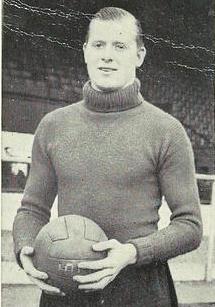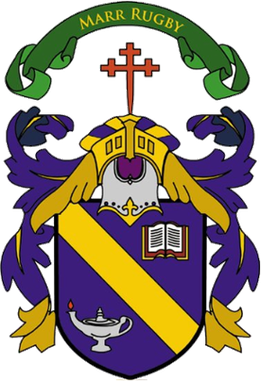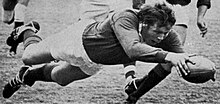James Thomson Greenwood was a Scottish rugby union player and coach. He won twenty caps for Scotland and four for the British Lions as a number eight and flanker.
Gordon Bulloch is a former Scotland international rugby union player.
James Telfer is a Scottish former rugby union coach and player. As a player, he won 21 international caps in the amateur era, also having a career as a headmaster at Hawick High School and Galashiels Academy and Forrester High School as a chemistry teacher. With Sir Ian McGeechan he had success with both the Scotland national team and the British Lions.

West of Scotland Football Club is a rugby union club based in Milngavie, Scotland. Founded in 1865, West of Scotland are one of the oldest rugby clubs in the world, and one of the founding members of the Scottish Rugby Union. West have enjoyed a long and successful history, winning numerous Scottish Championships and producing an incredible number of international players, and a strong contingent of British and Irish Lions.
Arthur Robert Smith was a Scotland international rugby union player. He played as a Wing.
Andrew Robertson Irvine is a former president of the Scottish Rugby Union (SRU), and a former Scottish international rugby player. He earned fifty one Scotland caps, captaining the team on fifteen occasions, and scored 250 points for Scotland. He went on three British Lions tours.
Finlay Calder OBE is a Scotland international former rugby union player.
Alexander Bennett Carmichael MBE was a Scotland international rugby union player.
John McLauchlan, known as Ian McLauchlan, is a former Scotland international rugby union player. Nicknamed Mighty Mouse, he represented Scotland at loosehead prop from 1969 to 1979.
Colonel Michael John Campbell-Lamerton was a Scotland international player. He was also a British Army officer.
Cameron Michael Henderson GibsonMBE is a former rugby union international player who represented Ireland and the British & Irish Lions.
Colin Thomas Deans MBE is a former Scotland international rugby union player.
In rugby union, the "99" call was a policy of simultaneous retaliation by the British Lions during their 1974 tour to South Africa. The tour was marred by on-pitch violence, which the match officials did little to control and the relative absence of cameras compared to the modern game made citing and punishment after the fact unlikely.

John Bell Brown was a Scottish footballer, who played as a goalkeeper. At club level he played for Clyde, Hibernian, Dundee and Kilmarnock, helping Clyde win the Scottish Cup in 1939. He also played once for the Scotland national football team, in a 1939 British Home Championship match against Wales.
Hugh Ferns McLeod OBE was a Scottish rugby union player, who played forty times for Scotland between 1954 and 1962. He played 14 times for the Barbarians between 1954 and 1959, scoring only once, a try in their 1958 match against East Africa in Nairobi on 28 May 1958. His home team was Hawick RFC. giving rise to his nickname, the Hawick Hardman. Allan Massie describes him as "Hawick through and through, and is indeed now President of the Club".
Kenneth James Forbes Scotland was a Scotland international rugby union player and a Scotland international cricket player. He played at full-back in rugby union.
Douglas Elliot also known as W.I.D. Elliot and Doug(ie) Elliot was a Scottish international rugby union player, who played for Scotland.
Nairn Alexander MacEwan was a Scottish international rugby player and coach. He played at flanker, and was capped twenty times for Scotland between 1971 and 1975, including a try in the match against England in 1972.
Gordon Herbert Waddell was a Scottish rugby union player, a South African politician, and the son of Herbert Waddell. He played for Scotland, the Barbarians and on two British and Irish Lions tours. In fact he is the only Scottish stand off to be a double Lion. He had 18 caps between 1957 and 1962 - this record for a Scotland fly-half was only later broken by John Rutherford. He played 12 times for the Barbarians between 1957 and 1960, scoring in three matches including their 1958 match against East Africa in Nairobi on 28 May 1958. In 1962 he was the controlling influence in Scotland's first win in Wales since the 1930s, a feat not repeated for another twenty years.

Marr RFC is a rugby union team based in Troon, Ayrshire, Scotland. They play in the Scottish Premiership.



